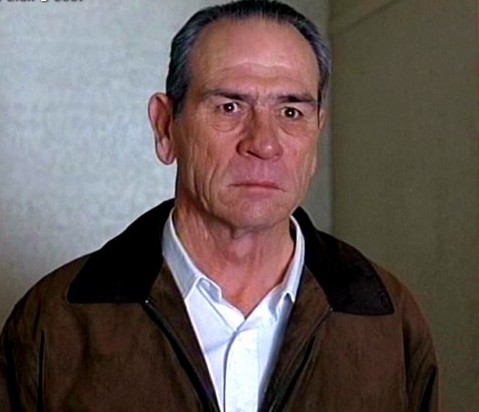 [Review, take 2.] Every day I think I’m going to wake up back in the desert… I must say, I went in expecting not much more than an over-the-top “message movie” schmaltzfest, or at best a harmless helping of mediocre, inert Oscar Bait like Cinderella Man or A Beautiful Mind. But Paul Haggis’ In the Valley of Elah, the first of four(!) movies I caught last Saturday, turned out to be quite a bit better than I expected. Rather, Elah is a melancholy rumination on the hidden casualties of (any) war and a somber inquiry into the heavy toll exacted on the wives, parents, and children of military men. (The families of military women will likely get their due in John Cusack’s forthcoming Grace is Gone.) The David and Goliath nonsequitur of its title notwithstanding, Elah more often brings to mind the questionable sacrifice for an unknown higher purpose in Abraham and Isaac, or the bloody fate of erstwhile brothers Cain and Abel. And, biblical parallels aside, the film showcases the best work Tommy Lee Jones has done in years. (Well, I didn’t see The Three Burials of Melquiades Estrada, and have high hopes for No Country for Old Men.) And it’s probably the most engaging police procedural of the year this side of Zodiac.
[Review, take 2.] Every day I think I’m going to wake up back in the desert… I must say, I went in expecting not much more than an over-the-top “message movie” schmaltzfest, or at best a harmless helping of mediocre, inert Oscar Bait like Cinderella Man or A Beautiful Mind. But Paul Haggis’ In the Valley of Elah, the first of four(!) movies I caught last Saturday, turned out to be quite a bit better than I expected. Rather, Elah is a melancholy rumination on the hidden casualties of (any) war and a somber inquiry into the heavy toll exacted on the wives, parents, and children of military men. (The families of military women will likely get their due in John Cusack’s forthcoming Grace is Gone.) The David and Goliath nonsequitur of its title notwithstanding, Elah more often brings to mind the questionable sacrifice for an unknown higher purpose in Abraham and Isaac, or the bloody fate of erstwhile brothers Cain and Abel. And, biblical parallels aside, the film showcases the best work Tommy Lee Jones has done in years. (Well, I didn’t see The Three Burials of Melquiades Estrada, and have high hopes for No Country for Old Men.) And it’s probably the most engaging police procedural of the year this side of Zodiac.
 “Dad?” Roused from a dream he can barely grasp the edges of, grizzled Vietnam Vet turned mechanic Hank Greenfield (Jones) is awoken one Tennessee morning by a call from faraway Fort Rudd, informing him not only that his son Mike is back from Iraq but has gone AWOL since getting back stateside. This doesn’t gibe with Hank, who’s been receiving image-laden e-mails from his second son during his tour (his first son already perished in his nation’s service), and so he packs his bags, kisses his wife (Susan Sarandon) goodbye, and drives straight through to New Mexico, looking to ascertain the score.
“Dad?” Roused from a dream he can barely grasp the edges of, grizzled Vietnam Vet turned mechanic Hank Greenfield (Jones) is awoken one Tennessee morning by a call from faraway Fort Rudd, informing him not only that his son Mike is back from Iraq but has gone AWOL since getting back stateside. This doesn’t gibe with Hank, who’s been receiving image-laden e-mails from his second son during his tour (his first son already perished in his nation’s service), and so he packs his bags, kisses his wife (Susan Sarandon) goodbye, and drives straight through to New Mexico, looking to ascertain the score.
The sergeant on duty at Ft. Rudd (James Franco) and Mike’s returning platoon members all think he’s just shacked up with a good time woman somewhere…but Hank’s not so certain. And, just as he’s beginning to tease clues off Mike’s damaged cameraphone, a charred, mutilated, and dismembered body is discovered on the outskirts of town. Sure enough, it’s Mike, and as the ensuing homicide investigation slips into the jursidictional crack between local law enforcement (most notably represented by Charlize Theron) and the Military Police (headed by bureaucrat Jason Patric), Hank takes it on himself to bring his son’s murderer to justice. But, as Hank well knows, the dogs of war impart a moon-touched madness on those they’ve mauled, and Hank will be forced to confront some ugly truths about his son, and the man he became in Iraq, in order to get to the bottom of things.
 Admittedly, the movie starts out kinda rocky (or perhaps I was just gunning for Haggis in the first reel.) Events occur early on that scream symbolic significance (you’ll know what I mean), people speak in characterization shorthand — “Someday, you’ll just have to trust somebody, Hank” — and some plot points just don’t hang together. How did Hank ever find that (symbolically-named) computer guru operating out of a van, and why does it take him so ever-loving long just to do a defrag? But, for whatever reason — my money’s mostly on Jones — Elah is a significantly subtler and more resonant film than I ever expected from the writer-director of the lamentable Crash. (Then again, a ball-peen hammer to the skull is subtler than Crash, a film which, as I noted in my review of Inside Man last year, feels like it was made by and for people who don’t get out very much.)
Admittedly, the movie starts out kinda rocky (or perhaps I was just gunning for Haggis in the first reel.) Events occur early on that scream symbolic significance (you’ll know what I mean), people speak in characterization shorthand — “Someday, you’ll just have to trust somebody, Hank” — and some plot points just don’t hang together. How did Hank ever find that (symbolically-named) computer guru operating out of a van, and why does it take him so ever-loving long just to do a defrag? But, for whatever reason — my money’s mostly on Jones — Elah is a significantly subtler and more resonant film than I ever expected from the writer-director of the lamentable Crash. (Then again, a ball-peen hammer to the skull is subtler than Crash, a film which, as I noted in my review of Inside Man last year, feels like it was made by and for people who don’t get out very much.)
In any case, Tommy Lee Jones is really excellent here: Check out the scene where he has to ID his son’s body in the morgue, or note how his early military rectitude seeps away as he sinks into the slough of despond. And Jones isn’t alone. Sarandon is memorable in every short scene she’s in, Theron is surprisingly believable as an ordinary (albeit beautiful) cop, and Patric — a dependable actor who never quite made it as a lead — seems to relish the freedom of his oncoming, paunchy Val Kilmer/Alec Baldwin phase. His “on a need to know basis” character in particular could’ve been way over the top, but Patric underplays him as a guy who really just doesn’t want to do the paperwork. (There’s also a brief but solid turn by Josh Brolin, Jones’ Coen compadre, as the local sheriff.)
Elah isn’t the best movie of the year or anything. But it is most of everything you’d want out of a fall film — It’s timely, sober-minded, well-acted and well-made. And, if nothing else, it shows Haggis has the ability to reboot after Crash.

